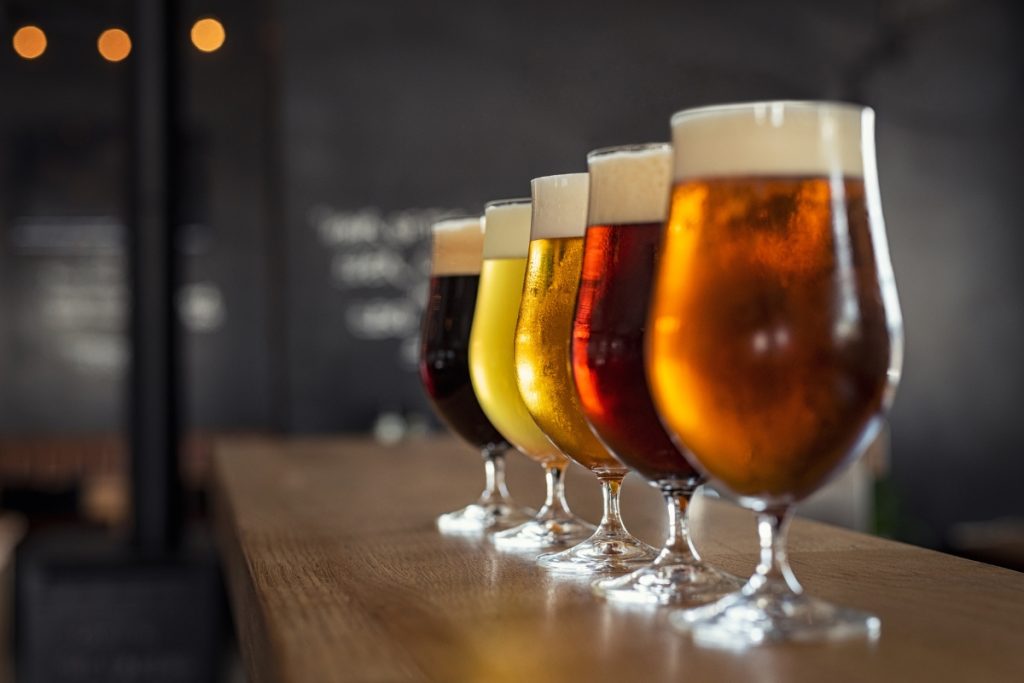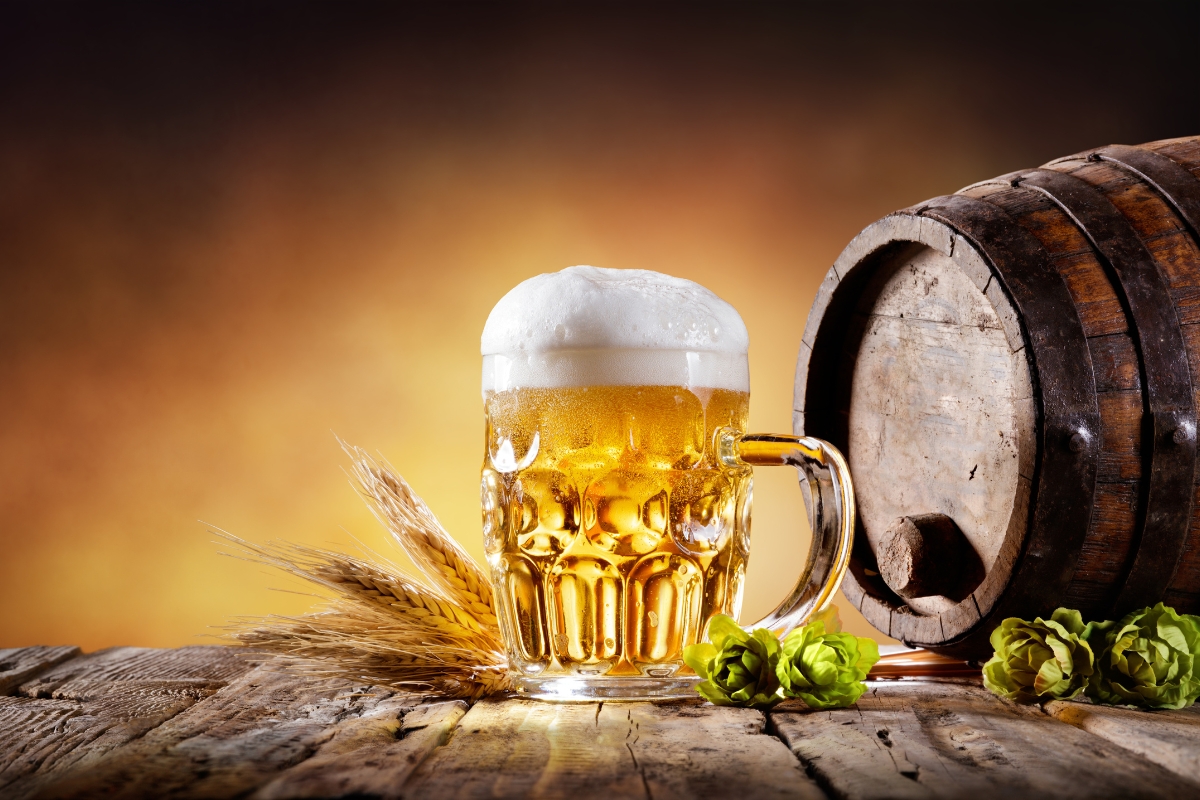
Welcome to hashtagspain.com! We are passionate about offering not only healthy food options but also a delightful array of beverages, including some of the finest Spanish beers. Spain is not only famous for its rich culture and beautiful landscapes but also for its beer tradition that dates back centuries. As we embark on this journey of taste and tradition, we invite you to explore the world of Spanish beers with us.
The beer tradition in Spain is a fascinating blend of history, culture, and innovation. Spaniards have been brewing and enjoying beer for hundreds of years, and this tradition has evolved to include a diverse range of beer styles to satisfy every palate. From light and refreshing lagers to complex and bold ales, Spanish beers have made a mark on the global beer scene. At hashtagspain.com, we take pride in curating a selection of the finest Spanish beers for our customers to experience and enjoy.
The Popular Beer Brands of Spain
Spain boasts a multitude of outstanding beer brands, each with its own unique characteristics and flavors. We’ve handpicked some of the most renowned Spanish beer brands for you to discover and savor. Here’s a glimpse into a few of them:
Mahou
Mahou is a name synonymous with Spanish beer excellence. With a heritage dating back to 1890, this brand has been producing high-quality lagers that capture the essence of Spanish beer culture. Mahou beers are known for their crispness and balanced flavors, making them a favorite choice among beer enthusiasts.
San Miguel
San Miguel is a beloved Spanish beer brand that has gained international recognition. Established in 1890, it has a history of crafting exceptional beers, including the iconic San Miguel Especial. This beer’s smooth and refreshing taste has made it a staple in the Spanish beer landscape.
Estrella Galicia
Estrella Galicia, brewed in the beautiful region of Galicia, is a symbol of Spanish brewing tradition. This brand offers a range of beers, with the Estrella Galicia Lager being a popular choice. It’s known for its clean, crisp profile and a touch of bitterness that appeals to a wide audience.
Estrella Levante
Hailing from the sunny shores of Murcia, Estrella Levante is a name you’ll often hear in Spain. Their flagship beer, Estrella Levante Especial, is a classic lager with a mild, well-balanced taste that complements various culinary delights.
Cruzcampo
Cruzcampo is a brand that embodies the spirit of Andalusia. Established in Seville in 1904, it has become a symbol of Southern Spanish beer culture. Cruzcampo’s beers offer a delightful blend of flavors and are cherished by locals and visitors alike.
Estrella Damm
Estrella Damm is a Barcelona-based brewery with a rich history dating back to 1876. Their beers, such as Estrella Damm Lager, are known for their smoothness and versatility. They pair wonderfully with a wide range of Spanish dishes.
El Águila
El Águila, brewed in Madrid, has been crafting beers since 1900. Their commitment to quality and tradition shines through in every sip of their beers. El Águila’s Vienna-style lager is a notable choice for those seeking a balanced and flavorful beer experience.
Alhambra
Alhambra is a brewery rooted in the heart of Granada, and it reflects the essence of this historic city in its beers. Alhambra Reserva 1925, an amber lager, is known for its rich maltiness and smooth finish, making it a favorite among beer connoisseurs.
Ambar
Ambar, founded in 1900 in Zaragoza, is known for its dedication to craft brewing. Their offerings include a variety of beer styles, with Ambar Export being a standout choice. This beer boasts a harmonious blend of malt and hops, delivering a well-rounded flavor.
Turia
Turia, based in Valencia, captures the essence of the Mediterranean in its beers. The Turia Märzen is a distinctive choice, offering a pleasant balance of malt sweetness and a hint of bitterness.
Moritz
Moritz is a brand with deep roots in Barcelona, dating back to 1856. Their beers, like Moritz Original, are characterized by a crisp and refreshing taste, making them a favorite among locals and tourists exploring the vibrant city.
Rosa Blanca
Rosa Blanca, a lesser-known gem from Madrid, offers a range of artisanal beers. Their Rosa Blanca Blonde Ale stands out with its fruity and floral notes, providing a unique and refreshing experience.
Oro
Oro, a beer brand from the Canary Islands, brings a touch of tropical flair to Spanish beer culture. Oro Añejo is a beer to savor, with its rich, full-bodied character and hints of caramel and spices.
At hashtagspain.com, we’re excited to present these exceptional Spanish beer brands to you. Whether you’re a seasoned beer enthusiast or new to the world of Spanish beers, we invite you to explore the flavors, traditions, and craftsmanship that make Spanish beers truly special. Cheers to a delightful journey of taste and tradition!
Origins of Brewing in Spain
Let’s delve into the fascinating origins of brewing in Spain, a journey that has been influenced by the Celts and Romans and has evolved over the centuries.
Celtic and Roman Influence
The roots of brewing in Spain trace back to ancient times when the Celts and Romans left their mark on the Iberian Peninsula. The Celts introduced beer-making techniques, including the use of malted barley, to Spain. Meanwhile, the Romans, known for their engineering prowess, contributed to the development of brewing by enhancing the infrastructure needed for brewing and distributing beer. This early influence laid the groundwork for the rich brewing tradition that Spain would later cultivate.
Evolution Through the Centuries
As Spain transitioned through different historical periods, its brewing practices continued to evolve. Two key epochs stand out in the history of Spanish brewing:
Medieval and Renaissance Period
During the Medieval and Renaissance periods, brewing in Spain underwent significant advancements. Brewing technologies improved, with innovations such as the use of hops and the development of specialized brewing vessels. These innovations not only enhanced the quality of Spanish beers but also diversified the range of flavors and styles available. Additionally, brewing gained socioeconomic importance, becoming a vital industry that contributed to local economies and provided livelihoods to many.
Modern and Contemporary Period
In more recent times, the modern and contemporary period, Spain’s brewing industry experienced transformative changes. One notable shift was the industrialization of breweries, which led to increased production and the introduction of mass-produced beers. This period saw the emergence of well-known Spanish beer brands that gained popularity not only within Spain but also on the international stage.
Simultaneously, the craft beer movement took root, bringing a resurgence of interest in traditional and artisanal brewing methods. Craft breweries and microbreweries began to flourish, offering a diverse range of unique and innovative beer styles. These craft brewers focused on quality, creativity, and using locally sourced ingredients, contributing to the renaissance of Spanish beer culture.
As we look back at the origins of brewing in Spain and its evolution over the centuries, we can see how this ancient tradition has been shaped by diverse influences and continues to thrive today.
Diversity of Spanish Beers
Let’s explore the remarkable diversity of Spanish beers, classifying them by types and styles, and discovering the prominent beer regions that have contributed to this rich tapestry.
Classification by Types and Styles
Spanish beers offer a wide array of types and styles, catering to various tastes and preferences. Here are some of the key classifications:
- Lagers: Spanning from light and refreshing to amber and full-bodied, lagers are a popular choice among Spanish beer enthusiasts. They often exhibit crispness and balanced flavors.
- Ales: Ales come in diverse styles, including pale ales, IPAs (India Pale Ales), and stouts. These beers are known for their robust and complex flavor profiles, often featuring fruity, hoppy, or roasted notes.
- Craft Beers: Craft breweries in Spain have embraced innovation and creativity, producing unique and artisanal beers. Craft beers cover a wide spectrum of styles, from fruity sours to bold barrel-aged brews.
- Amber Ales: Spaniards have a penchant for amber ales, which offer a balance of maltiness and hop bitterness. These beers are appreciated for their rich flavors and versatility.
- Blonde Ales: Blonde ales, characterized by their light and easy-drinking nature, are a popular choice in Spain, especially during the warm Mediterranean summers.
Prominent Beer Regions
Spain’s diverse geography has given rise to distinct beer regions, each with its own brewing traditions and specialties. Let’s explore a few of these prominent regions and the beers they offer:
Beers of Andalusia
- Alhambra: Hailing from Granada, Alhambra beers are known for their rich maltiness and smooth finish. Alhambra Reserva 1925, an amber lager, is a standout choice with its well-rounded flavor.
- Cruzcampo: Seville’s Cruzcampo is a symbol of Southern Spanish beer culture. Their beers offer a delightful blend of flavors and are cherished by locals and visitors alike.
Distinctive Features: Andalusian beers often reflect the region’s warmth and vibrant culture, with flavors that complement the sunny climate.
Beers of Catalonia
- Estrella Damm: Based in Barcelona, Estrella Damm is one of Spain’s oldest breweries. Their beers are known for their smoothness and versatility, pairing wonderfully with a wide range of Spanish dishes.
- Moritz: With deep roots in Barcelona dating back to 1856, Moritz is characterized by a crisp and refreshing taste, making it a favorite among locals and tourists exploring the vibrant city.
Innovations and Craft Beers: Catalonia has been at the forefront of Spain’s craft beer movement, with breweries experimenting and pushing boundaries to create innovative and artisanal brews.
Beers of Madrid
- Mahou: Founded in Madrid in 1890, Mahou is synonymous with Spanish beer excellence. Their beers are known for their crispness and balanced flavors, making them a favorite choice among beer enthusiasts.
- La Virgen: La Virgen is a Madrid-based craft brewery that has gained acclaim for its dedication to quality and creativity. They offer a range of craft beers that reflect the evolving tastes of Madrid’s beer enthusiasts.
Evolution and Current Trends: Madrid’s beer scene has evolved over the years, with established breweries coexisting with innovative craft brewers. Current trends in the region include a growing interest in craft and artisanal beers.
Cultural and Economic Impact
Let’s delve into the cultural and economic significance of beer in Spain, exploring its role in Spanish cuisine, the vibrant beer festivals and events, as well as its notable economic contributions.
Beer in Spanish Cuisine
Beer holds a special place in Spanish cuisine, complementing a wide range of dishes. Whether you’re savoring tapas in a bustling Spanish bar or enjoying a traditional meal, beer is a common companion. Here are some ways beer is intertwined with Spanish culinary culture:
- Tapas Pairing: In Spain, it’s customary to enjoy small plates of flavorful tapas alongside a refreshing beer. The crispness of a cold beer complements the rich and diverse flavors of tapas, creating a delightful gastronomic experience.
- Seafood and Beer: Spain’s extensive coastline means an abundance of seafood in its cuisine. The light and effervescent nature of beer pairs exceptionally well with fresh seafood dishes, enhancing the dining experience.
- Beer in Cooking: Spanish chefs often incorporate beer into their recipes. From beer-battered fish to beer-infused sauces, this versatile beverage adds depth and flavor to various dishes.
- Beer Culture: Spaniards value the social aspect of beer consumption. Gathering with friends and family for a “caña” (a small glass of beer) is a cherished tradition, fostering camaraderie and conversation.
Beer Festivals and Events
Spain hosts a vibrant array of beer festivals and events, celebrating the diversity of beer culture. These gatherings bring together beer enthusiasts, brewers, and food vendors to create memorable experiences. Here are a few notable beer events:
Notable Beer Events
- Calpe Oktoberfest: This annual event in Calpe, Valencia, brings the spirit of Munich’s Oktoberfest to Spain. Spanning several days, it features a wide variety of German and Spanish beers, traditional music, and Bavarian cuisine. It’s a lively celebration of beer and culture.
- Madrid Beer Festival: Held in the capital city, the Madrid Beer Festival is a gathering of craft beer aficionados. It showcases an extensive selection of craft beers from Spain and beyond, offering attendees the opportunity to explore new flavors and styles.
Economic Impact
Beyond its cultural significance, beer plays a substantial role in Spain’s economy. Let’s explore the economic impact of the beer industry:
- Contribution to Employment and Local Economy: The brewing industry in Spain provides employment opportunities across various sectors, from brewing and distribution to hospitality and tourism. Breweries and beer-related businesses contribute significantly to local economies in beer-producing regions.
- Exports and International Recognition: Spanish beers have gained recognition on the global stage, leading to increased exports. Brands like Estrella Damm and Mahou are enjoyed by beer enthusiasts worldwide, contributing to Spain’s export revenue.
- Tourism: Beer festivals, brewery tours, and tapas experiences attract tourists, boosting the hospitality and tourism sectors. Spain’s beer culture enhances the country’s appeal as a culinary and cultural destination.
Innovation and Sustainability in Spanish Brewing
Let’s explore the dynamic world of innovation and sustainability in Spanish brewing, focusing on the craft brewing movement, sustainable and eco-friendly practices, eco-friendly breweries, and emerging technologies.
Craft Brewing Movement
In recent years, Spain has witnessed a flourishing craft brewing movement, marked by innovation, creativity, and a commitment to quality. Craft breweries have emerged across the country, challenging traditional beer norms and offering unique flavors and styles. This movement has brought diversity and excitement to the Spanish beer scene, attracting a growing community of beer enthusiasts.
Sustainable and Eco-Friendly Practices
Sustainability and eco-consciousness are becoming increasingly important in the brewing industry. Many Spanish breweries have embraced sustainable practices, aligning their production processes with environmental responsibility. These practices include:
- Water Conservation: Breweries are implementing water-saving technologies to reduce their water usage during brewing, minimizing their environmental footprint.
- Energy Efficiency: Utilizing renewable energy sources and energy-efficient equipment, breweries are reducing their energy consumption and greenhouse gas emissions.
- Waste Reduction: Breweries are actively working to minimize waste generation and recycle or repurpose byproducts like spent grains and yeast.
- Local Sourcing: Embracing the farm-to-glass concept, some breweries source ingredients locally, supporting nearby farmers and reducing transportation emissions.
Eco-Friendly Breweries
Across Spain, eco-friendly breweries have emerged, leading the charge in sustainability initiatives. These breweries not only produce outstanding beers but also prioritize environmentally responsible practices:
Local Sustainability Initiatives
- Water Reclamation: Some breweries have implemented systems to capture and reuse water, reducing their overall water consumption.
- Sustainable Sourcing: Eco-conscious breweries prioritize locally sourced ingredients, reducing the carbon footprint associated with ingredient transportation.
Success Stories
Several Spanish breweries have gained recognition for their sustainability efforts. They serve as inspiring success stories within the industry, demonstrating that environmental responsibility can go hand in hand with brewing excellence.
Emerging Technologies
Innovations in brewing technologies are driving sustainability to new heights. Spanish breweries are exploring eco-friendly brewing processes and innovations in packaging and distribution:
Eco-Friendly Brewing Processes
- CO2 Recovery: Some breweries are implementing CO2 recovery systems, capturing and reusing carbon dioxide produced during fermentation, reducing the need for external sources.
- Green Heating: Breweries are exploring renewable energy sources such as solar or biomass for heating and cooling processes.
Innovations in Packaging and Distribution
- Eco-Packaging: Breweries are adopting eco-friendly packaging materials, including recyclable and biodegradable options, to reduce the environmental impact of their products.
- Efficient Distribution: Innovations in distribution logistics, such as optimized routes and electric delivery vehicles, are helping reduce carbon emissions during transportation.
Conclusion
In conclusion, Spanish brewing is experiencing a remarkable era of innovation and sustainability. The craft brewing movement is injecting creativity and diversity into the industry, while eco-friendly breweries and emerging technologies are driving sustainability to new heights. At hashtagspain.com, we are committed to supporting these initiatives by offering a selection of Spanish craft beers that showcase the passion, creativity, and sustainability efforts of Spanish brewers. Join us in celebrating the innovative and eco-conscious spirit of Spanish brewing! Cheers to a brighter and more sustainable future for beer and the planet.

